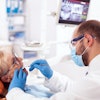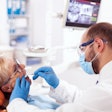
It's time for the dental office to be proactive about heart health, according to Karen Davis, RDH. Davis spoke about how dental teams can promote cardiovascular wellness at the 2019 California Dental Association's CDA Presents meeting in Anaheim, CA.
 Karen Davis, RDH.
Karen Davis, RDH.Scientists already know oral and cardiovascular health are inextricably linked, and new research has suggested periodontal disease may even contribute to hardening of the arteries. By helping patients maintain healthy gums, dental teams can also help reduce patients' overall inflammation -- and maybe even save lives.
"Strokes and heart attacks are the culmination of the perfect storm with generally more than one risk factor," Davis told DrBicuspid.com. "Dental professionals have opportunities to reduce at least one factor that, in the end, may prevent a cardiovascular event and save a life."
4 ways
Interested in promoting cardiovascular health in your practice but don't know where to start? Here are four things the dental team can do for healthy mouths and hearts.
1. Talk about nutrition
Eating nutritious food helps promote overall wellness and can benefit both oral and cardiovascular health, Davis noted.
"We have ample opportunities to help educate patients about dietary changes that benefit both the heart and oral cavity, such as eating plant-dominated diets and avoiding added sugar and processed foods," she said.
It's also important for dental teams to practice what they preach, Davis said. Too often, she sees break rooms full of proinflammatory snacks.
"Quit having the lunch or break room loaded with proinflammatory foods and beverages for the dental team to indulge in," she said. "We are much more convincing with our patients about healthy diets if we practice what we preach, so start reducing your own risks first. "
2. Ask about cardiovascular health
One way dental teams can promote healthy mouths and hearts is to ask about cardiovascular health on intake forms. Some questions Davis recommended include the following:
- Do you exercise? If so, how often?
- What beverage do you generally drink during the day?
- How many hours of sleep do you average?
- Have you had a carotid intima-media thickness test to screen for atherosclerosis? If so, when?
3. Test, test, and test some more
Hypertension is asymptomatic, so dental offices can and should perform blood pressure screenings on every patient visit, Davis said. She also recommended incorporating salivary diagnostics to identify high-risk periodontal pathogens.
“Prevention is key.”
"These salivary tests are easy to perform in the dental office," Davis said. "I find it helps patients take ownership of a condition that frequently has no symptoms, and the retest helps ensure reduction and/or elimination of proinflammatory pathogens."
If you notice a patient may be at risk for cardiovascular disease, you can suggest that the patient get further testing, Davis added.
"Dental professionals can help sound the alarm to let patients know there are simple tests that can help them discover if they already have evidence of disease, such as a carotid intima-media thickness test," she said.
4. Take periodontal disease seriously
Periodontal disease may be common among U.S. adults, but it is still a serious condition. Davis noted concern about the number of bloody prophys she sees at dental hygiene visits.
"If we really comprehended how connected periodontal health and heart health were, bloody prophys would not be an outcome but rather a sign of alarm that this patient needs immediate attention," Davis said. "We can and should do a better job diagnosing and intervening to treat the early stages or periodontitis and helping to reverse gingivitis."
By helping to reverse inflammatory oral conditions, Davis hopes dental teams can ultimately help prevent severe gum disease and heart disease.
"Prevention is key," she said. "Cardiovascular disease and chronic periodontitis are largely preventable. In my opinion, understanding risk factors and educating patients how to prevent both conditions is where we need to invest more time with our patients."



















